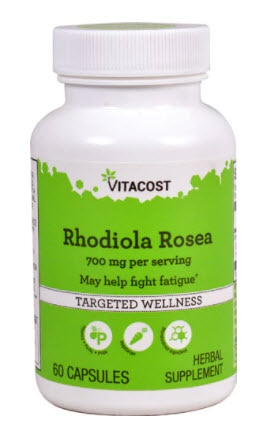An energetic body and an elevated mind often top our list of health goals—and we just as frequently do whatever we can to nail it, from grasping for anything sugary within reach to downing caffeine.
And yet,
natural energy is readily available to us—if we know how to accomplish it. In addition to staying hydrated, eating well, exercising regularly—and even
sitting up straighter—there are a number of herbal remedies that may naturally support greater stamina, stronger brain power, and improved vitality.
Sound like something you need? Read on to learn about five of the leading herbs to support natural energy.
†

Herbs for Energy†
1. Siberian ginseng
Also known as
eleuthero root, Siberian ginseng has long been a mainstay in Russia and China for its potential to strengthen the body and organically bolster energy. Derived from a slow-growing, deciduous shrub that’s native to Asia, it’s considered an adaptogen—an herbal plant that works with the body to help reduce physical, biological and chemical stress (and we all know how drained we can feel when under duress). One of Siberian ginseng’s main components, eleutherosides, may be responsible for its potential benefits.
†
2. Cordyceps sinesi
Cordyceps sinesi -- also called caterpillar fungus – has long been a staple of Traditional Chinese Medicine. Why? Because the herb, which is derived from a rare mushroom, can be a boon when it comes to supporting health. This is due in part to the antioxidants it contains.
Additionally, cordyceps sinesi supports energy on a cellular level through adenosine triphosphate (or ATP)—the molecule that ushers energy from the food you eat to your cells. Virtually unknown in the West until 1993, when a group of Chinese runners attributed their world records to a cordyceps-based tonic, the herb is also believed to be an activator of immune response.
†
3. American ginseng
Technically known as
Panax quinquefolius,
American ginseng is one of the most popular herbal remedies on the market, with more than 6 million Americans taking it on a regular basis. Its significance comes down to the fact that it contains ginsenosides, active compounds that naturally encourage protection from free radical damage. It’s also rich in polysaccharides and oligopeptides, which address oxidative stress and support higher energy within cells.
Also, a 2012 study published by the National Institutes of Health discovered that ginseng has the capacity to organically facilitate a host of healthy immune functions—and a healthy immune system is
key to maintaining optimal energy levels. (One to try:
Vitacost's American Ginseng Extract. Not only does it supply 500 mg of American ginseng per 2-capsule serving, it’s free of milk, eggs, peanuts, tree nuts, crustacean shellfish, fish, soy, gluten, and titanium dioxide.)
†
4. Rhodiola rosea
An enormous part of maintaining your pep? Emotional wellness.
Rhodiola—another adaptogenic herb—grows in the cool, mountainous regions of Asia and Europe and may naturally back a solider emotional foundation. Used for centuries in Russia and Scandinavia to stimulate physical endurance and energy, it contains rosavins, a phytochemical that’s believed to have mood-boosting properties.
Indeed, while research on the herb has thus far been limited in the U.S.,
Mental Health America reports that those studies, as well as the traditional practices that spawned them, “have caused people to use rhodiola to treat a wide range of conditions, such as stress, fatigue, anxiety, depression and cognitive impairment, primarily in Eastern Europe and Asia, but increasingly in the United States and around the world.” What’s more, one study, of 56 physicians working night duty, found that taking 170 mg of rhodiola rosea for two weeks decreased mental fatigue and improved work-related tasks by twenty percent.
†
5. Ashwagandha
Used for over 3,000 years by Ayurvedic health practitioners,
ashwagandha—or Indian ginseng—is, like other herbs mentioned here, an adaptogenic, which, as discussed, helps your body acclimate to the effects of stress and its energy-crushing impact. Two of ashwagandha’s central active compounds, alkaloids and lactones (which fall into the category of withanolides), contribute to its ability to uphold well-being, including providing nutritional support under times of physical or mental stress.
Ashwagandha also supports hormone levels and reproductive health, and, when taken with a multivitamin, it may help support healthier, calmer moods—a cornerstone of energy and renewal. Less anxiety and a finer-working mind? That’s one of the tickets to great—and sustained—natural energy.
†
†These statements have not been approved by the Food and Drug Administration. These products are not intended to diagnose, treat, cure or prevent disease.
Featured products:









